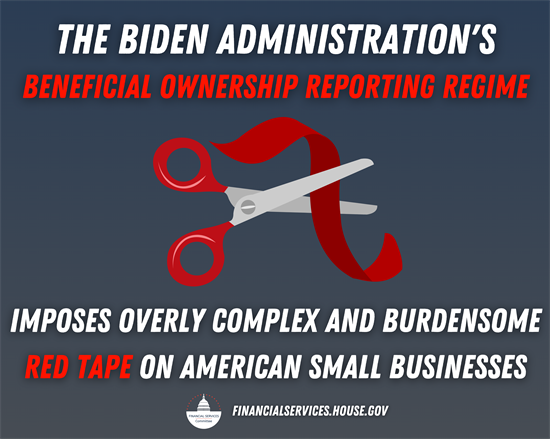On January 1, 2024, new beneficial ownership information (BOI) reporting requirements went into effect. The reporting requirements were implemented under the Corporate Transparency Act (CTA), which was designed to strengthen national security tools by identifying shell companies that may be used for illicit activity. The goal of the CTA was to balance the national security interests of law enforcement with reporting companies’ burdens and civil liberties.
The Treasury Department and the Financial Crimes Enforcement Network (FinCEN), have transformed a simple-to-follow filing system into a complex maze that heavily strays from Congress’ intent and burdens small businesses.
Every single small business in America will be forced to comply with these new, onerous, and overly complex regulations by submitting detailed reports that include their owners’ sensitive personal information or face civil and criminal penalties.
Poorly Implemented, Overly Complex and Onerous BOI Reporting Requirements:
Expand information required to be reported in the CTA
- The CTA was initially drafted to require four pieces of information from persons who are reporting as beneficial owners: (1) a full legal name, (2) business or residential address, (3) date of birth, and (4) a “unique identifying number from an acceptable identification document.”
- However, the final rule issued by FinCEN significantly expands the required information beyond those identified in the CTA.
Fail to protect sensitive small business information and civil liberties
- In the CTA, Republicans secured the strongest privacy and disclosure protections for America’s small businesses as it relates to the collection, maintenance, and disclosure of beneficial ownership information.
- The protections set out in CTA ensure that small business beneficial ownership information is treated and protected just like an individual’s tax return information.
- Instead of adhering to the bipartisan agreement by protecting the sensitive information of American small businesses just like tax returns as Congress intended, the Biden Administration opted to completely reinvent the wheel by establishing a new overly complex and less secure access regime.
Lack education for small businesses regarding their reporting requirements
- Every single small business in America will be forced to comply with these new, onerous, and overly complex regulations by submitting detailed reports that include their owners’ sensitive personal information or face civil and criminal penalties.
- According to FinCEN, there will be approximately 32.6 million companies required to report BOI information in year one, and 5 million additional reporting companies in each of the subsequent nine years.
- It is unclear what Treasury and FinCEN are doing to communicate key compliance and process information to impacted small businesses.
- In fact, 90% of small businesses—the backbone of the American economy—are completely unaware of their new beneficial ownership information reporting responsibilities, according to a recent survey by the National Federation for Independent Businesses.
- This leaves small businesses vulnerable to civil and criminal penalties for non-compliance with a reporting regime they are unaware even exists.
Create loopholes that leave national security at risk
- Under the BOI reporting regime established by FinCEN’s implementation of the CTA, companies were given an option to state that they were “unable to obtain” or “unable to identify” their true ownership.
- The inclusion of these options disregards Congressional intent and undermines the national security effectiveness of the law by allowing bad actors to continue obscuring the identity of the beneficial owners of a firm potentially operating for illicit purposes.
House Financial Services Committee Solutions to Fix the BOI Reporting Regime:
On December 18, 2023, Chairman Patrick McHenry (NC-10), Rep. Warren Davidson (OH-08), Senator Rick Scott (R-FL), and Senator Mike Rounds (R-SD) led 76 of their colleagues in sending a bicameral letter to Janet Yellen, Secretary of the Treasury, and Andrea Gacki, Director of the Financial Crimes Enforcement Network (FinCEN), requesting a delay in the implementation of new beneficial ownership reporting requirements for small businesses until these concerns are addressed.
At a September markup, the Committee advanced two critical bills to reform FinCEN and fix flaws in its implementation of the CTA, including:
- Rep. Warren Davidson’s (OH-08) FinCEN Oversight and Accountability Act of 2023, which provides Congress with prompt notification of any unlawful activity carried out by FinCEN or employees of FinCEN, enables Congress to better understand the authorities Treasury has delegated to FinCEN, and requires FinCEN to hold an annual Small Business Working Group to educate small businesses on beneficial ownership.
- Rep. Zach Nunn’s (IA-03) Protect Small Business and Prevent Illicit Financial Activity Act, which reverts the FinCEN beneficial ownership filing deadline back to Congress’ intended timelines and closes a FinCEN-created loophole that can be exploited by bad actors.
- o Congressman Nunn’s Protect Small Business and Prevent Illicit Financial Activity Act subsequently passed the House with broad, bipartisan support in December.
Chairman McHenry also introduced two of legislation to fix the BOI reporting regime to better align its implementation with Congressional intent and provide greater oversight of FinCEN, including:
- H.R. 4035, the Protect Small Business Information Act
- H.R. 4036, the Accountability Through Confirmation Act
###
